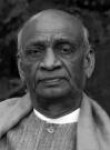Pointless pontification

You don’t say!
Darius Nakhoonwala
Much of last week was taken up in debating what was essentially a non-issue from any viewpoint, namely, whether Sardar Vallabhbhai Patel’s legacy ‘belonged’ to the Congress alone, and whether the BJP had a right to “appropriate” it.
The controversy was a contrived and nonsensical one. It arose when Narendra Modi, the BJP’s prime ministerial candidate for the 2014 general election, announced that he was going to build a gigantic 600 foot statue and memorial for Patel. He also said that "Had Sardar Vallabhbhai Patel been the country's first prime minister, India's fortunes would have been entirely different."
The Congress, which had been building memorials only to the Gandhi family, was first stunned and then galvanised into a pained shriek of protest. Foolishly, it insisted that only the Congress could claim Patel.
The TV channels picked it up and, since these days the agenda for print is set by TV, so did the newspapers. All the big ones offered their wisdom on it, to what purpose I am yet to ascertain. Perhaps it was to demonstrate, yet again, that everyone is taking the easy way out for choosing edit topics.
The Indian Express was the first off the mark. It said the “Congress and BJP have long fought a tug of war over the image of Sardar Vallabhbhai Patel.” If so, why the sudden hysteria then? But the Express did make a valid point that “the BJP likes to trace its genealogy to… the tough, culturally conservative, capitalist-friendly Patel.”
The Hindu, whose stature has been steadily diminishing, said that Nehru and Patel “disagreed on the execution of certain policies but they placed the interests of the newly-born nation above everything else, and repeatedly reaffirmed their faith in each other.” Yawn!
Then it took on Mr Modi’s remark about how things would have been better if he “been at the helm instead of Nehru.” Then it said “Given that Patel died in 1950, such theoretical speculation is futile.” It should have stopped the edit right after that sentence but went on for another 188 words.
The Times of India asked a rhetorical question: Does anyone own a public figure? Then it gave the answer: “Patel belonged to a generation that had to painstakingly build the foundation of a nation and he opposed bigotry.”
That was that but the space had to be filled and it wrote another 289 words. No one who read it would have emerged much wiser not least because of the following generalisation: “The current petty controversy over Patel shows there is a disconnect between India's political parties and rest of society.” What pompous nonsense.
The Pioneer, as befits a pro-BJP publication, wanted to know why “the Congress is so enraged over the so-called appropriation by the Bharatiya Janata Party of Sardar Vallabhbhai Patel's legacy.” Then it said, predictably, that “the Congress's outrage is misplaced.” And then came the sermon on Congress’s acts of omission and commission. Oh, man!
The Deccan Herald reiterated all the known facts and “Sardar Patel was disappointed, but never bitter” over the fact that Gandhiji asked him to make way for Nehru as PM. It added “That was the measure of the man. He remained a close ally and comrade of Nehru on the key issues of the day, though there were differences of temperament and ideological moulding between the two men.” This was followed by some potted history.
It would have been far better for all, like the Hindustan Times and Business Standard and many others did, to have ignored the topic altogether.
Such articles are only possible because of your support. Help the Hoot. The Hoot is an independent initiative of the Media Foundation and requires funds for independent media monitoring. Please support us. Every rupee helps.






